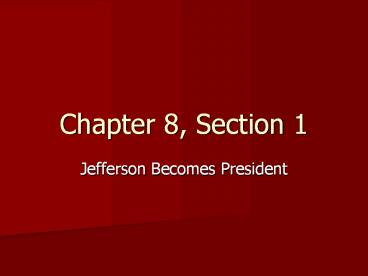Chapter 8, Section 1 - PowerPoint PPT Presentation
1 / 15
Title: Chapter 8, Section 1
1
Chapter 8, Section 1
- Jefferson Becomes President
2
The Election of 1800
- Federalists
- John Adams and Charles Pinckney candidates
- Democratic-Republicans
- Thomas Jefferson and Aaron Burr
- Both parties believed that the election outcome
was vital to the nations survival
3
The Election of 1800
- Campaigning
- Unlike today, where candidates travel and give
speeches, presidential candidates in 1800 made
their arguments in letters and newspaper
editorials - Federalist arguments
- Painted Thomas Jefferson as a pro-French radical
- Warned that electing him would result in violence
in chaos - Stated that his interest in science and
philosophy would destroy organized religion
4
The Election of 1800
- Democratic-Republican arguments
- Portrayed John Adams as a royalist
- Harshly criticized the Alien and Sedition Acts
- Warned that John Adams would use the newly
created American military to limit the rights of
the common man - Election Results
- Thomas Jefferson and Aaron Burr tied at 73 votes
- John Adams received 65 votes and Pinckney
received 64
5
The Election of 1800
- Result Problems
- Under the Constitution at the time, the two
candidates with the most votes became President
and Vice President - Because of the tie, the decision went tot the
House of Representatives, as per the Constitution
- House of Representatives was also deadlocked
- Vote after vote resulted in a tie
- Thomas Jefferson finally won the election on the
36th vote - Marked the first time that one party had replaced
another in power in the United States - Problems with the voting system led to the 12th
Amendment - Created a separate ballot for President and Vice
President
6
(No Transcript)
7
Jeffersons Policies
- Very different from President George Washington
and President John Adams - Different ideas
- Both Washington and Adams favored a strong,
central government while Thomas Jefferson
supported states rights - Sought to limit the powers of government
- Different Style
- Thomas Jefferson was less formal than his
predecessors
8
Jefferson is Inaugurated
- Americans were excited about Thomas Jefferson
- People traveled to Washington D.C. to hear his
inauguration address to the nation - President Thomas Jefferson delivered his speech
in a quiet voice - Made it clear that he supported the will of the
majority - Stressed the need for limited government and
protection of civil liberties
9
Jefferson in Office
- President Thomas Jefferson faced the task of
putting his political ideas into practice - Selected James Madison as his secretary of state
and Albert Gallatin as secretary of treasury - Jefferson would benefit from the
Democratic-Republican controlled congress - Allowed the Alien and Sedition Acts to expire
- Jefferson lowered military spending and reduced
the size of the army and navy - Hoped that the money saved would help pay for the
national debt
10
Jefferson in Office
- Government in 1801
- Consisted of only a few hundred people
- President Thomas Jefferson hoped to keep it that
way, believing that the primary functions of the
federal government were - Protect the nation from foreign threats
- Deliver mail
- Collect Customs Duties
- Jefferson did realize that some Federalist
policies-such as the Bank of the United
States-needed to be kept
11
Marbury v. Madison
- Even though the Democratic-Republicans controlled
Congress, Federalists controlled the federal
judiciary - Judiciary Act of 1801
- Created 16 new federal judgeships filled with
Federalists - Done just before Adamss term of office ended
- Some of the appointments were made so late that
the documents that authorized them had not been
delivered by the time Adams left office
12
Marbury v. Madison
- William Marbury
- Did not receive his appointment documents until
after Adams had left office - When Thomas Jefferson took office, William
Marbury demanded the documents - On Jeffersons advice, however, the new secretary
of State, James Madison, refused to deliver them - Jefferson argued that the appointment of
midnight judges was not valid
13
Marbury v. Madison
- Marbury sued, asking the Supreme Court to order
Madison the deliver the appointment papers - Marbury argued that the Judiciary Act of 1789
gave the court the power to do so - John Marshall, a Federalist appointed by John
Adams as the Chief Justice of the Supreme Court,
agreed to hear the case - Jefferson protested because John Marshall was one
of his political rivals
14
Marbury v. Madison
- Marbury v. Madison
- Helped establish the Supreme Courts power to
check the power of the other branches of
government - The Courts Opinion
- The Constitution gave the Supreme Court authority
to hear only certain types of cases and Marburys
request was not one of them. - Therefore, the law that Marburys cases depended
on was declared unconstitutional
15
Marbury v. Madison
- By denying Marburys case, the Court avoided a
direct confrontation with Jeffersons
administration - Established the power of judicial review
- The power to declare an act of Congress
unconstitutional































